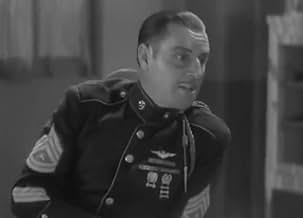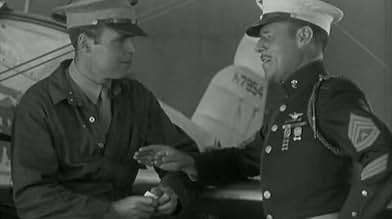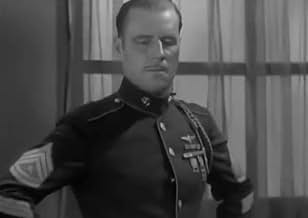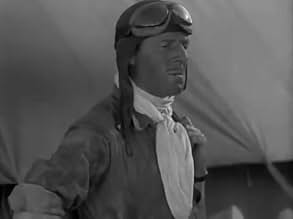VALUTAZIONE IMDb
6,0/10
429
LA TUA VALUTAZIONE
Aggiungi una trama nella tua linguaA Marine flyer and his flight school mentor fall for the same beautiful nurse.A Marine flyer and his flight school mentor fall for the same beautiful nurse.A Marine flyer and his flight school mentor fall for the same beautiful nurse.
- Regia
- Sceneggiatura
- Star
Harold Goodwin
- Steve Roberts
- (as Harald Goodwin)
Joe Bordeaux
- Marine
- (non citato nei titoli originali)
Walter Brennan
- Marine Pilot
- (non citato nei titoli originali)
Eddy Chandler
- Marine Sergeant - Panama's Buddy
- (non citato nei titoli originali)
Edgar Dearing
- Football Coach
- (non citato nei titoli originali)
George Irving
- Marine Colonel in Nicaragua
- (non citato nei titoli originali)
Recensioni in evidenza
I recently saw this on Turner Classics. I had never seen this film from the early days of talking pictures before. Adding to its historic value is that it's directed by legendary Frank Capra from early in his career. Actor Ralph Graves who plays Lefty Phillips wrote the story, using two unrelated actual current events of the day to bookend his story; a wrong-way run in the Rose Bowl and a rogue general in Nicaragua. The Phillips character is based on Roy 'Wrong Way' Riegels who played for Cal-Berkeley against Georgia Tech in the 1929 Rose Bowl. He picked up a fumble, was spun around and ran 65 yards the wrong way before being stopped short of the opponent's goal. Lefty is distraught by the humiliation and goes on to join the Marines Navy Air Corps. Riegels would later join the Army Air Corps in WWII so it's kind of like art imitating life and then life imitating art. Jack Holt is Sgt. Panama Williams who trains the pilots. Lila Lee is nurse Elinor Murray, the love interest of both Panama and Lefty. Panama, Lefty and Elinor are all sent to Nicaragua where a rogue general and his guerrilla army have killed US Marines stationed there. In reality US Marines were in Nicaragua from 1927 to 1933. Small individual armies roamed the country and the US government was instituting a unified national guard and set up Anastasio Somoza Garcia to run it. General Augusto César Sandino was a guerrilla leader who's forces fought against the US Marines for five years. In this ficitonalized account of that conflict, Sandino is a character named Lobo played by Jimmy de la Cruze. Elmer Dyer who shot the aerial scenes for such Films as Hell's Angels, Lost Horizon, The Dawn Patrol and Air Force is the principal Ariel photographer on this film and Joe Novak and Joseph Walker are cinematographers. Howard J. Green wrote the screenplay from Graves' original story with additional dialogue from director Capra. Holt had the most successful and long- lived film career of the three lead actors. An established silent film star, he smoothly made the transition to sound films and had a long career in b-westerns and crime movies. Graves was a silent film actor who's continued success was limited to the 1930's. He made a couple films in the 40's in minor roles and then his career was over. Lee was at the peak of her career here having made 11 films in 1928, 9 in 1929 and 6 in 1930 before her career began to taper off. She was a promising silent film actor who never lived up to the expectations the studio had for her after making the transition from silents to sound. This isn't a great film. It's kind of silly and awkward at times but it's well done and fun to see a Capra film just seven years into his directorial career and the film has it's early sound and early aviation historic value. It's worth a look. I would give it a 6.5 out of 10.
Frank Capra takes to the air in this rip off of William Wellman's silent Wings (27) but it never gets off the ground. Capra seems ill equipped to deal with aviation the way WW 1 pilot Wellman is and it shows early on.
Footballer Lefty Phelps makes headlines when he runs the wrong way (ala Roy "Wrong Way" Rigel's Rose Bowl gaffe) in the big game. Shamed beyond belief he joins the Marines after meeting the admirable Panama Williams who offers sympathy and advice. Phelps ends up training to be a pilot under Williams command but he washes out. He stays on in a non-pilot capacity and begins to romance Panama's desire Nurse Murray. Friction ensues between the two but there's a rebellion to fight in Central America and this enables Lefty to redeem himself.
Flight is at a disadvantage from the start due to progress-sound. 29 was a transitional year in sound and it hampers the action and performances. Because cameras were so noisy they had to be sound proofed, restricting movement. Actors were untested in voice and nuance when it came to sound and Capra regular Ralph Graves as Lefty sulking and lumbering about comes up short in both. Tim Holt's father fares far better and Lilla Lee sporting eye lashes as wide as the wings on Von Richthofen's Fokker is more Boop than Bara.
Capra's mise en scene and editing are pedestrian with actors poorly posed (once again to accommodate the microphone) and reacting foolishly to off screen action. There are some decent air acrobatics and a striking approach shot to an enemy fortress but special effects are glaringly poor in spots and overall it remains inferior in every aspect to Wings and thus reaffirms that Silents are golden, especially when its accompanied by a rousing pipe organ score.
Footballer Lefty Phelps makes headlines when he runs the wrong way (ala Roy "Wrong Way" Rigel's Rose Bowl gaffe) in the big game. Shamed beyond belief he joins the Marines after meeting the admirable Panama Williams who offers sympathy and advice. Phelps ends up training to be a pilot under Williams command but he washes out. He stays on in a non-pilot capacity and begins to romance Panama's desire Nurse Murray. Friction ensues between the two but there's a rebellion to fight in Central America and this enables Lefty to redeem himself.
Flight is at a disadvantage from the start due to progress-sound. 29 was a transitional year in sound and it hampers the action and performances. Because cameras were so noisy they had to be sound proofed, restricting movement. Actors were untested in voice and nuance when it came to sound and Capra regular Ralph Graves as Lefty sulking and lumbering about comes up short in both. Tim Holt's father fares far better and Lilla Lee sporting eye lashes as wide as the wings on Von Richthofen's Fokker is more Boop than Bara.
Capra's mise en scene and editing are pedestrian with actors poorly posed (once again to accommodate the microphone) and reacting foolishly to off screen action. There are some decent air acrobatics and a striking approach shot to an enemy fortress but special effects are glaringly poor in spots and overall it remains inferior in every aspect to Wings and thus reaffirms that Silents are golden, especially when its accompanied by a rousing pipe organ score.
Frank Capra made a trilogy of action dramas starring Ralph Graves and Jack Holt (Tim Holt's father) as rivals in some branch of the military service. Holt always played the cautious older man who followed regulations, Graves his impetuous younger rival. A woman always came between them. "Dirigible" is probably the best of the three, although "Submarine" (a silent film) and "Flight" are excellent too.
The only flaw in "Flight" is that it's a little too similar to the better-known "Wings" and "Tell It to the Marines", both of which were bigger box-office hits.
The opening scene in 'Flight' is based on a real-life event that had made headlines a few months earlier. In the Rose Bowl football match on New Year's Day, 1929, a college football player named Roy Riegels carried the ball 64-1/2 yards the wrong way, very nearly scoring an own goal when a teammate finally stopped him on the one-yard line. (The rival team ran interference for him against his own side!) A news photo of this event received nationwide distribution, and Riegels became a laughingstock. (Actually, when I saw 'Flight', all I knew about the Riegels incident was the famous Rose Bowl photograph. I looked up all the specifics before I posted this review. Did you really think I've got all this information memorised?)
"Flight" uses this true incident to begin its fictional story. Lefty Phelps (Ralph Graves) isn't noticeably left-handed, but he's a promising college athlete who's all set to triumph in the big game. Phelps runs the wrong way, scoring the winning touchdown for the wrong team. A photo of Phelps achieving this error gets national distribution, and Phelps becomes the butt of jokes. (We see a close-up of the Riegels photo - a well-known image in 1929 - substituting as a photo of Ralph Graves.) Phelps decides that he's ruined for life, but a friendly recruiting agent suggests that he can make a clean start by enlisting in the U.S. Marine Corps. Phelps decides to become a pilot, as that's the most glamorous job in the military.
There's a very funny scene when Phelps completes his first training flight. I'm really surprised that this gag sequence (dealing with nausea and vomiting) made it into the movie. Ralph Graves steps out of the plane with one hand over his mouth, and we can tell by the look on his face that he's going to be sick. Graves looks round desperately, and then we see an immense close-up of a bucket at the far end of the runway. Graves runs all the way to the bucket with one hand over his mouth and the other hand over his gut. Will he make it in time? The pay-off is hilarious.
During his training, Phelps becomes attracted to an Army nurse (played by Lila Lee) and he runs afoul of topkick Sergeant Williams (Jack Holt). Williams thinks Phelps is paying too much attention to girls, and not enough attention to his flight training. As soon as Phelps completes his pilot training, the United States Marines invade Nicaragua (wot, again?), and off we go to Central America. There's a slam-bang action climax. Lila Lee was a very pretty actress, unfairly forgotten today. (She was also the mother of James Kirkwood Junior, who wrote "A Chorus Line".) "Flight" and "The Unholy Three" are the best examples of her talents and beauty. I'll rate 'Flight' 10 out of 10; a splendid example of early Capra.
The only flaw in "Flight" is that it's a little too similar to the better-known "Wings" and "Tell It to the Marines", both of which were bigger box-office hits.
The opening scene in 'Flight' is based on a real-life event that had made headlines a few months earlier. In the Rose Bowl football match on New Year's Day, 1929, a college football player named Roy Riegels carried the ball 64-1/2 yards the wrong way, very nearly scoring an own goal when a teammate finally stopped him on the one-yard line. (The rival team ran interference for him against his own side!) A news photo of this event received nationwide distribution, and Riegels became a laughingstock. (Actually, when I saw 'Flight', all I knew about the Riegels incident was the famous Rose Bowl photograph. I looked up all the specifics before I posted this review. Did you really think I've got all this information memorised?)
"Flight" uses this true incident to begin its fictional story. Lefty Phelps (Ralph Graves) isn't noticeably left-handed, but he's a promising college athlete who's all set to triumph in the big game. Phelps runs the wrong way, scoring the winning touchdown for the wrong team. A photo of Phelps achieving this error gets national distribution, and Phelps becomes the butt of jokes. (We see a close-up of the Riegels photo - a well-known image in 1929 - substituting as a photo of Ralph Graves.) Phelps decides that he's ruined for life, but a friendly recruiting agent suggests that he can make a clean start by enlisting in the U.S. Marine Corps. Phelps decides to become a pilot, as that's the most glamorous job in the military.
There's a very funny scene when Phelps completes his first training flight. I'm really surprised that this gag sequence (dealing with nausea and vomiting) made it into the movie. Ralph Graves steps out of the plane with one hand over his mouth, and we can tell by the look on his face that he's going to be sick. Graves looks round desperately, and then we see an immense close-up of a bucket at the far end of the runway. Graves runs all the way to the bucket with one hand over his mouth and the other hand over his gut. Will he make it in time? The pay-off is hilarious.
During his training, Phelps becomes attracted to an Army nurse (played by Lila Lee) and he runs afoul of topkick Sergeant Williams (Jack Holt). Williams thinks Phelps is paying too much attention to girls, and not enough attention to his flight training. As soon as Phelps completes his pilot training, the United States Marines invade Nicaragua (wot, again?), and off we go to Central America. There's a slam-bang action climax. Lila Lee was a very pretty actress, unfairly forgotten today. (She was also the mother of James Kirkwood Junior, who wrote "A Chorus Line".) "Flight" and "The Unholy Three" are the best examples of her talents and beauty. I'll rate 'Flight' 10 out of 10; a splendid example of early Capra.
The plot is certainly familiar from many other movies, notably "Tell it to the Marines". The old timer versus the cheeky new recruit. And of course the girl that the sergeant wants is actually in love with the recruit, who feels rotten about it because the sergeant has been so nice to him. But the characters are interesting, particularly Jack Holt's,the camaraderie is nice to watch and there is plenty of action, flying scenes and battle scenes,fascinating shots of old time airplanes, all of which make this a fun movie to watch, which after all is the important thing in a movie of this type.Very pleasant entertainment in spite of the sound problems.
Flight (1929)
** (out of 4)
Frank Capra directed this early talkie about two buddies (Jack Holt, Ralph Graves) in the Navy Air Corps who fall in love with the same woman (Lila Lee). This film runs nearly two hours and one of those hours are brilliant but it's spread across the entire running time. The flight and war sequences are simply brilliant with a lot of realistic action and some breathtaking footage of the planes in the air. Had Capra only shown that stuff then this could have been another masterpiece from the director but sadly we get a stupid love story to drag everything down. Jack Holt is brilliant in his role adding a lot of humor to the part but Graves, who co-wrote the story, doesn't fair as well. Lila Lee is cute in her part but she's certainly not the greatest actress out there.
** (out of 4)
Frank Capra directed this early talkie about two buddies (Jack Holt, Ralph Graves) in the Navy Air Corps who fall in love with the same woman (Lila Lee). This film runs nearly two hours and one of those hours are brilliant but it's spread across the entire running time. The flight and war sequences are simply brilliant with a lot of realistic action and some breathtaking footage of the planes in the air. Had Capra only shown that stuff then this could have been another masterpiece from the director but sadly we get a stupid love story to drag everything down. Jack Holt is brilliant in his role adding a lot of humor to the part but Graves, who co-wrote the story, doesn't fair as well. Lila Lee is cute in her part but she's certainly not the greatest actress out there.
Lo sapevi?
- QuizThe wrong-way run was based on the infamous play by Roy Riegels of the University of California in the 1929 Rose Bowl. With the score 0-0 in the second quarter, Riegels recovered a Georgia Tech fumble at the Yellow Jackets' 30, but he somehow got turned the wrong way and ran 65 yards toward his own goal line. A teammate grabbed him, but he was dropped at his own 1. The Golden Bears elected to punt, the punt was blocked out of the end zone for a safety touch and the two points provided the margin of victory in Georgia Tech's 8-7 win. The movie uses actual footage of Riegels from the game.
- BlooperWhen Lefty Phelps is polishing an aircraft, Sergeant Williams calls to him by yelling "Hey, soldier!" As both men are US Marines, the sergeant would not have addressed him that way. Soldiers are members of the US Army and a Marine would actually consider that remark to be an insult.
- Citazioni
Steve Roberts: [On the Nicaraguan rebels] You know damn well what's going to happen if these people come along and catch you alive.
- ConnessioniFeatured in Frank Capra, il était une fois l'Amérique (2020)
- Colonne sonoreMy Mammy
(1921) (uncredited)
Music by Walter Donaldson
Lyrics by Sam Lewis and Joe Young
Sung a bit a cappella by Ralph Graves
I più visti
Accedi per valutare e creare un elenco di titoli salvati per ottenere consigli personalizzati
Dettagli
- Tempo di esecuzione
- 1h 50min(110 min)
- Colore
Contribuisci a questa pagina
Suggerisci una modifica o aggiungi i contenuti mancanti




























